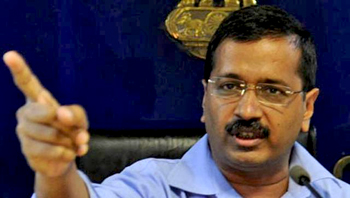New Delhi, Nov 1: Had the guilty been punished after the 1984 anti-Sikh riots, incidents like in Gujarat and Dadri would not have happened and "such intolerance" would not have spread, Delhi Chief Minister Arvind Kejriwal said today.

"If those guilty in the 1984 riots were punished in the past 31 years, then incidents like those in Gujarat and Dadri would not have happened.
"No one would have dared to spread hatred among people on basis of religion and such intolerance would not have spread in the country," the Chief Minister said after distributing the cheques in West Delhi's Tilak Vihar here.
The Chief Minister also claimed that "intolerance and hatred is thriving because those perpetrating it know that those in power will protect them".
He claimed that the Centre ordered constitution of Special Investigation Team (SIT) to probe the riots because it was "afraid" that once his government takes charge the guilty will be brought to book. Kejriwal also said that he will get it legally examined if the Centre was within its rights to constitute the SIT in this matter.
"In these 31 years, almost every party formed government in Delhi as well as at the Centre. BJP and Congress formed governments in Delhi, NDA and Congress formed government in Centre and every party and government kept on saying that Sikhs should be given justice. But who else will ensure justice if the government doesn't?
"During our 49-day regime we had ordered the constitution of SIT which wasn't formed in 30 years. But when we had resigned from the government, it was cancelled.
"However, when we formed government again on February 14, just a day before that the central government constituted an SIT because they were scared that when Arvind will come to power, all those who are guilty will be booked," he added.
The Chief Minister said "the intolerance in the country has reached so high that even the President has raised concern on the same four times during this month".
In October last year, a hike in compensation to Rs five lakh had been announced by the central government, five months after the BJP had formed its government at the Centre.
In August this year, the Delhi Cabinet decided to distribute enhanced compensation cheques as announced by the central government to the kin of the 1984 anti-Sikh riot victims.
Delhi Government has estimated an expenditure of around Rs 130 crore on compensation for around 2,600 families of ant-Sikh riot victims. The Centre will later refund the compensation amount to the Delhi Government.
Kejriwal said that former party leader and senior advocate HS Phoolka has asserted that the central government doesn't have the power to constitute the SIT.
"Phoolka ji has said that the central government doesn't have the power to form SIT, it lies with the Delhi Government. Tomorrow itself I will get this examined whether the SIT formed by centre government is legal or not," he said.
Deputy Chief Minister Manish Sisodia, who along with Kejriwal wore a black band on the sleeves as symbolic protest, hit out at the then Congress government.
"The riots were not a tragedy but a government supported murder. The government has not only kept the guilty shielded but also given them tickets for elections, made them ministers too," he said.
"Incidents like Sunped and Dadri are indicative of that there has been no development. We might have developed technologically, infrastructurally but our politics is still the same, our mentality is still the same, which is very dangerous.
"People are burnt alive and our leaders say that if any dog is hit by a stone what can be done. If after 31 years the mentality of those in power has not changed, we have surely not made any progress," he added.
Sisodia said that 1,300 families whose verification and other required formalities were completed were given the cheques today and the rest will be handed over their compensation cheques within 15 days.






Comments
Add new comment